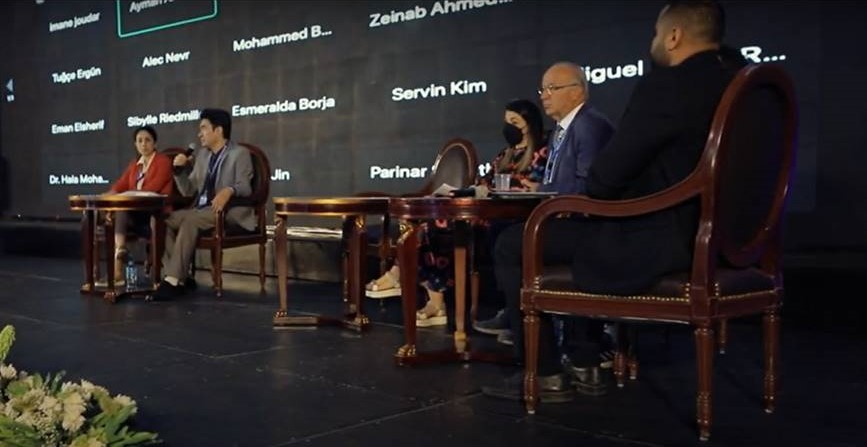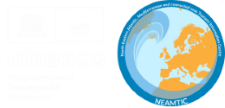Enhancing and Scaling up Actions for Resilient and Safer Coast Discussed/Highlighted at the African Conference on Priority Setting and Partnership Development for the United Nations Decade of Ocean Science.
The Intergovernmental Coordination Group for the Tsunami Early Warning and Mitigation System in the North-Eastern Atlantic, the Mediterranean and Connected Seas (ICG/NEAMTWS) in partnership with the National Institute in Oceanography and Fisheries (NIOF, Egypt) organized a side event on “Resilient and Safer Coasts” at the kickoff African Conference on Priority Setting and Partnership Development for the United Nations Decade of Ocean Science for Sustainable Development on 11 May 2022 in Cairo, Egypt. The side event brought together key figures including Mr Vladimir Ryabinin, Executive Secretary of the Intergovernmental Oceanographic Commission of UNESCO (IOC-UNESCO); Mr Mohamed Taher Elsherief, Governor of Alexandria, Egypt; Mr Bernardo Aliaga, Head of Tsunami Section of IOC-UNESCO; Mr Denis Chang Seng, ICG/NEAMTWS Technical Secretary; Ms Derya Vennin, CoastWAVE Associate Project Officer; Ms Maria Ana Baptistia, ICG/NEAMTWS Chair; Mr Amr Hamouda, President of NIOF; and Peter Billing, Head of unit at the European Union Directorate-General for European Civil Protection and Humanitarian Aid Operations (DG ECHO). Mr Mohamed Taher Elsherief stated “We need to unite efforts to find solutions to the main challenges facing the oceans and contribute in limiting climate change in the effect of sea level rise and marine natural hazards that affects the shores of the coastal cities like Alexandria” in reference to United Nations Decade of Ocean Science for Sustainable Development (2021-2030) and the societal outcome of a “Safe Ocean”.

Stage of the “Resilient and Safer Coasts” African Ocean side event, Egypt, Cairo. Participants from left to right: Ms Derya Vennin, Mr Denis Chang Seng, Ms Elena Daskalaki, Mr Ahmet Cevdet Yalçıner, and Mr Mohamed Taher Elsherief.
The “Resilient and Safer Coasts” side event provided a platform for an interactive and engaging dialogue on sea level related hazards, risks and emerging challenges. It showcased how to scale-up approaches and actions for resilient and safer coasts in the North African and South Mediterranean countries. Experts from the region, Mr Alessandro Amato, National Institute of Geophysics and Volcanology (INGV), Italy; Ms Elena Daskalaki, National Observatory of Athens (NOA), Greece; Mr Ahmet Cevdet Yalçıner, Middle East Technical University (METU), Turkey; Mr Khalid El Khalidi, Chouaïb Doukkali University (CDU), Morocco; and Mr Ignacio Aguirre Ayerbe, Environmental Hydraulics Institute of the University of Cantabria (IHCantabria), Spain including those from the Indian Ocean shared their experiences on how to contribute to the United Nations (UN) Ocean Decade: Resilient and Safer Coasts in the Mediterranean and North African region. The event highlighted the ongoing efforts concerning the development of a new UN Ocean Decade Tsunami Programme (ODTP) and strategies that will shape tsunami risk governance, and disaster risk reduction, including the new ICG/NEAMTWS 2030 Strategy.
Under the ODTP framework a Scientific Committee (SC) has been assembled to prepare the 10-Year Research, Development and Implementation Plan for the Ocean Decade Tsunami Programme, with the aim of making 100% of communities at risk of tsunami prepared for and resilient to tsunamis by 2030, through the implementation of the IOC-UNESCO “Tsunami Ready Recognition Programme (TRRP)” and other initiatives. The side event sought to engage and inspire communities prone to tsunami risk, to become Tsunami Ready.
The event provided an opportunity to show case the joint IOC-UNESCO and EU DG ECHO “CoastWAVE Project”, Mr Denis Chang Seng expressed that CoastWAVE “will enhance and scale-up actions though new technological detection, monitoring and alerts systems, as well as through Tsunami Ready Recognized Communities in several countries in North Africa and the Mediterranean region”. Ms Derya Vennin built on this statement and informed that “Inexpensive Device for Sea-level measurements (IDSL) and Tsunami Alerting Devices (TAD) will be installed and maintained to monitor, detect, and alert tsunamis in nominated communities of the CoastWAVE Project. While IDSLs will help quantifying hazard and exposure to risk of tsunamis, TADs will provide the necessary warnings for people to protect themselves and initiate emergency procedures”. The CoastWAVE project target is to have seven IOC-UNESCO Tsunami Ready Recognized communities by 2023 including two from the North African Mediterranean region: Morocco (El Jadida) and Egypt (Alexandria). About the role of NIOF/Egypt, Mr Amr Hamouda declared, “NIOF/Egypt wants to build capacity in tsunami and better communicate about coastal hazards for safer coast. We need to have a plan to save many people, especially with increasing traffic as a challenge”. The CoastWAVE project is in the process of receiving endorsement as a UN Ocean Decade project.
The side event brought young professionals from the region to capture how they are inspired to contribute to achieving an effective Tsunami Early Warning and Mitigation System (TEWS), risk reduction and a Safe Ocean. The young professionals, Ms Claire Jaffrézic, ICG/NEAMTWS Intern, France; Ms Imane Joudar, CDU, Morocco; Mr Mohamed Salah Hassan, researcher at NIOF, Egypt; and Ms Gözde Güney Doğan, METU, Turkey added their voice and aspirations to this endeavor. A key message to all stakeholders present in the event conveyed that strengthened partnerships collaborations, research, sciences, data sharing and community based tools are critical to advance TEWS, build resilience and coastal safety.









































